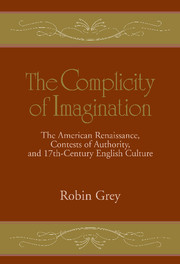 The Complicity of Imagination
The Complicity of Imagination Book contents
- Frontmatter
- Contents
- Acknowledgments
- Cambridge studies in American Literature and Culture
- Introduction: Antebellum America and the Culture of Seventeenth-Century England
- 1 Cultural Predicaments and Authorial Responses
- 2 “A Seraph's Elequence” Emerson's Inspired Language and Milton's Apocalyptic Prose
- 3 Margaret Fuller's “The Two Herberts,” Emerson, and the Disavowal of Sequestered Virtue
- 4 “As if a green bough were laid across the page”: Thoreau's Seventeenth-Century Landscapes and Extravagant Personae
- 5 Melville's Mardi and Moby-Dick, Marvelous Travel Narratives, and Seventeenth-Century Methods of Inquiry
- 6 Surmising the Infidel: Melville Reads Milton
- Notes
- Index
- Cambridge Cultural Social Studies
Introduction: Antebellum America and the Culture of Seventeenth-Century England
Published online by Cambridge University Press: 05 November 2009
- Frontmatter
- Contents
- Acknowledgments
- Cambridge studies in American Literature and Culture
- Introduction: Antebellum America and the Culture of Seventeenth-Century England
- 1 Cultural Predicaments and Authorial Responses
- 2 “A Seraph's Elequence” Emerson's Inspired Language and Milton's Apocalyptic Prose
- 3 Margaret Fuller's “The Two Herberts,” Emerson, and the Disavowal of Sequestered Virtue
- 4 “As if a green bough were laid across the page”: Thoreau's Seventeenth-Century Landscapes and Extravagant Personae
- 5 Melville's Mardi and Moby-Dick, Marvelous Travel Narratives, and Seventeenth-Century Methods of Inquiry
- 6 Surmising the Infidel: Melville Reads Milton
- Notes
- Index
- Cambridge Cultural Social Studies
Summary
This study examines the significant relationship between four antebellum nineteenth-century American authors and the writers, culture, and politics of seventeenth-century England. The relationship is a rich and complex one, but critical treatment has been only intermittent, and the connections noticed by scholars have been disparate, or confined to instances of local and explicit literary indebtedness. Even when F. O. Matthiessen noted the “vogue” for seventeenth-century writers among “American Renaissance” authors, his analysis emphasized many of the New Criticism's preoccupations with “the metaphysical strain,” and in the tradition of T. S. Eliot, focused upon the formal features of seventeenth-century poetry and its tendency toward Neoplatonic “transcendence” of history. However inadvertent, the enduring effect of Matthiessen's interpretation has been both to aestheticize and to dehistoricize the American authors' interest in seventeenth-century English culture. Following Matthiessen, several commentators have suggested that seventeenth-century English writers offered American authors a source of transhistorical “humanist” values, or a convenient repository of arcane and antiquarian lore. More recently, critics have noted Matthiessen's heavy reliance upon Shakespeare in the formation of his American literature canon: Elizabethan (and Caroline) literature became a “means of securing English Renaissance validity for American Renaissance figures.”
I would like to argue instead for an “American Renaissance” whose writers were sufficient in their own agency, confident in their own powers, and deeply enough read in the earlier period to revise those earlier cultural artifacts for their own distinctive aesthetic, social, and sometimes political purposes. This study in fact complicates the ways Americans defined their individual and national identities, as well as their relationship with their historical predecessors, both English and American.
- Type
- Chapter
- Information
- The Complicity of ImaginationThe American Renaissance, Contests of Authority, and Seventeenth-Century English Culture, pp. 1 - 17Publisher: Cambridge University PressPrint publication year: 1997


